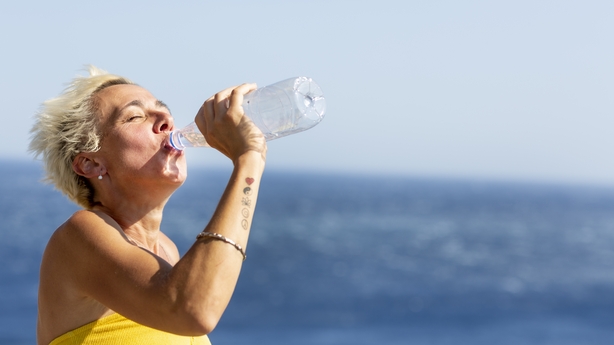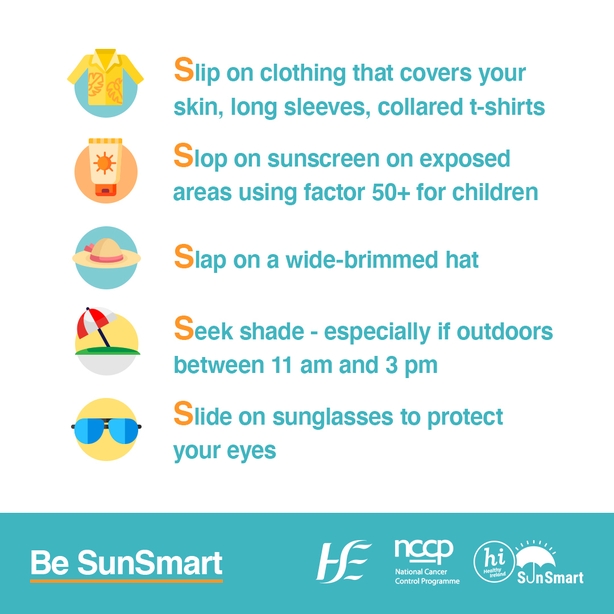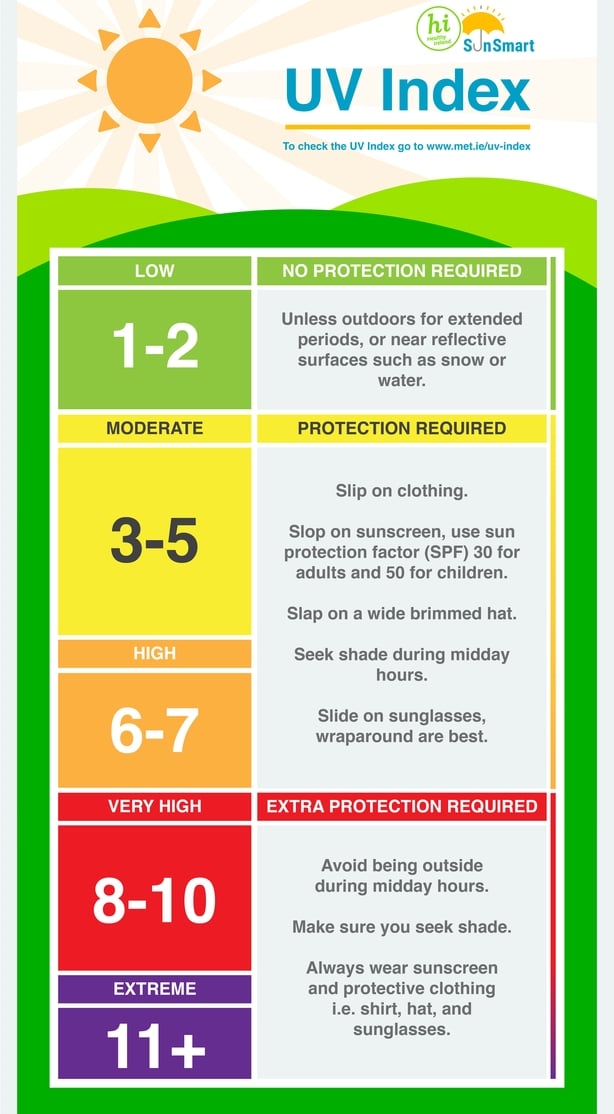With a high temperature warning in place for Ireland for next Sunday, Monday and Tuesday, it looks like we will be dealing with what could potentially be up to 30 degrees Celsius or higher.
The arrival of these temperatures will be good news for some, but will fill others with dread.
Whatever your outlook, this sustained heat over three days and nights will mean we all need to take precautions.
So, what can we do to avoid some of the symptoms of over-exposure to what will be unseasonal heat for us here in Ireland?
Hydration
Getting enough water into the system is one of the best ways to deal with rising temperatures. Most adults need around 2 litres of liquids each day but that can vary.
Dr Ina Kelly is a Consultant in Public Health Medicine and she says taking steps to regulate our body's own temperature is crucial.
The basic steps to do just that include topping up our liquid intake, keeping our homes cool and avoiding over-exposure to the sun over long periods of time.
"The things we can do in our own house is to make sure there is no heating on, keeping out the sun between 11am and 3pm by covering windows and if you have to go out make sure you have applied sunscreen."
Heat stress, heat exhaustion and heatstroke can affect us in many different ways and particular groups need to take extra care in the coming days.
They include people over 65 years of age, babies and children, and those with underlying health conditions.

Dr Kelly said: "You should never leave a baby in a car during high temperatures and for carers, who may be looking after someone who is vulnerable, such as babies or people over 65 who are not in control of their own environment, they should make sure they stay cool and drink enough."
If someone is feeling unwell, is disoriented or experiencing seizures or a quickening heartbeat, they should seek medical help.
"Heat is one of those fundamental energy sources but you don’t want too much. If you start going outside what the body can take, and each person will be different, every organ of the body can come under stress," Dr Kelly said.
While rehydration can address most people's symptoms, Dr Kelly said a prolonged deficiency of fluids can damage organs from which those organs "may never properly recover and may be fatal" in extreme situations.
Further heatwave advice can be found here on the HSE website.
Avoiding sunburn
Heatwaves not only bring high temperatures but can also mean a rise in the UV index. That can result in sunburn which can not only be uncomfortable but can also be hazardous.
With clear skies expected the risk of sunburn will be greater, especially between the hours of 11am and 3pm.
When the UV index is above 3 it is time to take action to protect your skin.
Dr Triona McCarthy is a Consultant in Public Health Medicine with the National Cancer Control Programme.
She says limiting your time in the sun between 11am and 3pm can make a big difference.
If you are outside in the sun then try to keep in mind the SunSmart 5 Ss.

Dr McCarthy said we should plan ahead if we intend to be out and about during the heatwave.
She said sunscreen should be reapplied every two hours especially if people are working outdoors, exercising, or are enjoying a day at the beach.
She said using sunscreen properly is vitally important, adding that the mistake people make is that they don't use it often enough or apply enough.
She said not wearing sunglasses can lead to damage at the back of the eyes and may lead to the development of cataracts.
She said the 5 Ss are not only important for adults to follow, but also for young children who she said had the "most vulnerable skin".

"Skin cancers in later life can be linked to sunburn in childhood and you should do all you can to protect your child particularly at this time of the year."
Keeping your home cool
Dr Diarmuid Quinlan, medical director of the Irish College of General Practitioners, said the best way to keep homes cool in hot weather is to keep the sun out.
"The best way to do this is by closing curtains or pulling blinds."
"If we want to keep the windows open, we need to remember that if the air temperature outside is hotter than inside, then actually we're bringing in warm air into the house.
"But in the evening the temperature often drops and the air temperature can be cooler than in the house, so maybe late in the evening or at night it may be helpful to have the windows open."
Considerations for older patients on medications
Professor Rose Anne Kenny specialises in medical gerontology and so works with older patients.
A professor at TCD & St James' hospital, she said that older people are at a higher risk because as we age, our bodies don't regulate our temperature as accurately as in our youth.
People on certain medications are also more likely to have problems with the heat, she said.
"Those are medications like diuretics, which are water loosening medications, beta blockers which slow the heart rate down and modify our ability to change temperatures, and sedatives", she said.
She said the advice for older people is not to go out at all if possible, and spend minimum time in direct heat.
Try to keep the home as cool and dark as possible, try to spend most of your time in the coolest room and drink plenty of water, she said.
Seek to stay cool at night-time
Met Éireann has warned that temperatures may stay uncomfortably warm over night during this forecast hot spell.
Professor Kenny said that older people in particular should be cautious at night.
"Overnight we are inclined to drop our blood pressure for various reasons. If that's coupled with dehydration, then people are more likely to have a near faint or a full faint, if they get up in the night to go to the loo for example".
"Be cautious that during the day, there's enough fluids on board, keep your room as cool as possible, don't wear bed clothes in possible, if you need to wear night clothes, make sure they're cotton, and if possible use a fan at night".
Taking a dip?
With the mercury on the rise, there is always the temptation to hit the beach for a dip.
Water Safety Ireland has appealed to people to stay safe while in the water.
It says an average of nine people drown every month in Ireland, so if you plan to access any of the country's waterways over the coming days to cool off, then check out this advice before hand.
We need your consent to load this rte-player contentWe use rte-player to manage extra content that can set cookies on your device and collect data about your activity. Please review their details and accept them to load the content.Manage Preferences
The current forecast means this hot weather doesn't strictly meet the criteria for a heatwave - which is five consecutive days of 25C or more.
But for Ireland, if the forecasts are correct, it could feel like one.
Additional reporting Laura Hogan

